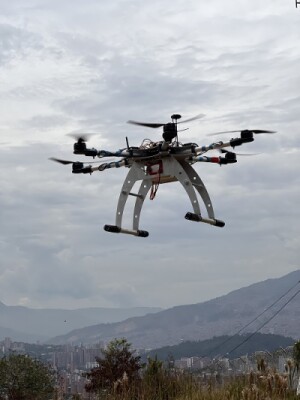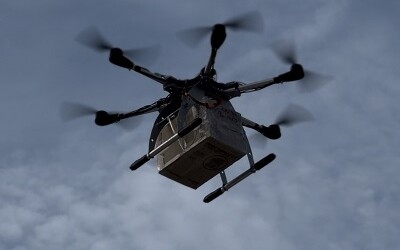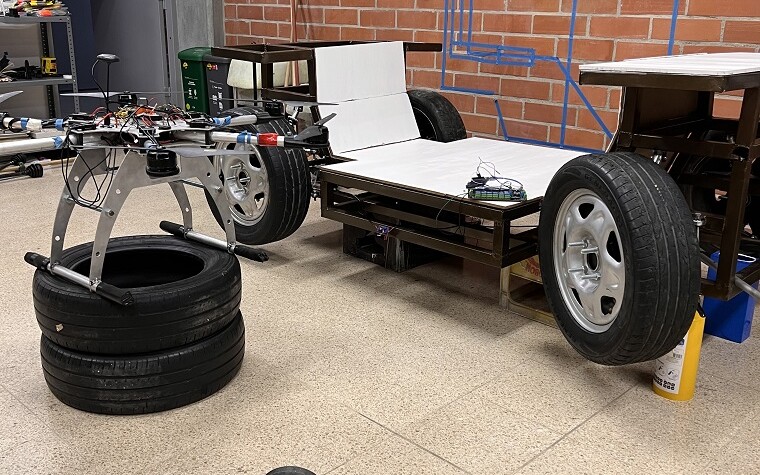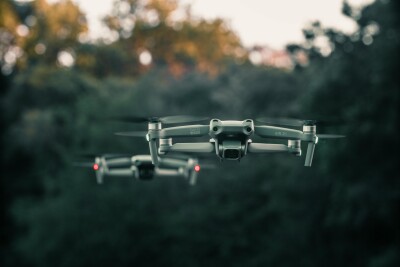During the recent Drone Summit Medellin in Colombia, we met a lot of enthusiastic entrepreneurs who are taking the uncrewed aviation industry by storm, but one presentation in particular caught our attention when a 21-year-old young man claimed that he had 10 years of experience in robotics.

His name is Jhon Mario Avilés Ruiz, and he started working with robots at the ripe age of 11. Now he is the CEO of TreeTech, and his contagious enthusiasm for this new industry was an inspiration to the audience during his presentation. We connected with Jhon Mario and his partners at their booth for a fascinating conversation about the plans of TreeTech for the near future.
“Yes, I know it’s difficult to believe but at 11 I was fascinated by technology, especially robots and their ability to do things independently,” Jhon said with enthusiasm. “That led me to participate in different robotic competitions, first at a city level, then nationally and eventually internationally. I’ve had the opportunity to travel to Panama, USA, Spain, Portugal, Holland, and even China showing and competing with the robots I made with my team.”
In our conversation with Jhon and his partners, we noticed that for them the uncrewed industry is not exclusively aerial, and we asked for clarification.
“Our approach to robotics is to focus on the solution and most of the time that answer is not exclusively an aerial or a ground vehicle but a combination where both help each other,” Jhon said. “Take the city of Medellin as an example: a city where you can find dense traffic throughout all hours of the day, a drone is the ideal solution to get from one point to another in minutes and, at the same time, to be able to have autonomous intercommunicating vehicles walking around the city avoiding traffic, carrying goods and people, and of course, in the less accessible parts of the city, robots that can walk on the sidewalks reaching homes, and bringing these advantages to the countryside.”
 The way cities are laid out in North America and South America is very different, and therefore the robotic solutions to address diverse problems differ dramatically.
The way cities are laid out in North America and South America is very different, and therefore the robotic solutions to address diverse problems differ dramatically.
“We focus in solving three main issues, reduce pollution, alleviate traffic or congestion and prevent accidents,” Jhon said. “With these three guiding principles, we embark on new designs by measuring how they will have a significant impact on each one. For example, traffic in our Latin American cities is stressful to deal with every day, so developing autonomous vehicles which can improve roadway efficiency, increase passenger safety, and can plan the best route, while reducing CO2 emissions will make a difference for residents who use them daily. At the end, the solution will be a combination of vehicles, each designed to solve a particular stage of the delivery process.”
As usual the conversation turned to regulation and how the different entities in charge of traffic, both on the ground and in the air, are progressing in their respective legislations.
“We are 10, 15 or perhaps 20 years away from a working legislation that would allow these robotic solutions to have a real impact,” Jhon said. “It’s not just one government entity but many: from ground, which is in the hands of thousands of individual municipalities, to air which is the sole domain of the civil aviation authorities (CAA) in each country. Our solutions will have to address each and every one in order to be commercially viable and that is a huge task.”
 As with any other startup, TreeTech is struggling to keep the doors open while they invest heavily in research and development (R&D) and make small advances with the authorities.
As with any other startup, TreeTech is struggling to keep the doors open while they invest heavily in research and development (R&D) and make small advances with the authorities.
“Venture Capital (VC) is our main source of funding at this point, but we are working on a delivery service that will generate revenue and be the foundation for a sustainable business.” Jhon said. “We see the recent RAC 100 uncrewed aviation regulation in Colombia as a great starting point to bring new approaches to drone deliveries to the market, as we wait for the ground solutions to have a more friendly legislative framework.”
It was fascinating to hear and explore the view of the future of uncrewed aviation—or perhaps it would be more appropriate to say “robotics industry”—from the point of view of a 21-year-old scientist. Jhon and his team know deep in their hearts that they will spend the rest of their lives making history as they advance the cause of non-piloted vehicles in search of a better and healthier planet.




.png.small.400x400.png)










Comments